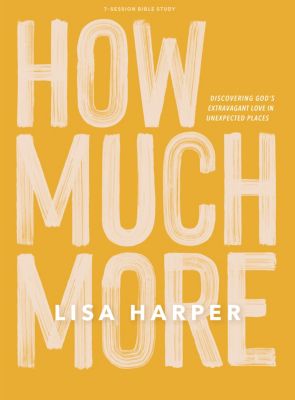A master storyteller and sought-after Bible teacher and author known for her authenticity, Lisa Harper‘s writing and speaking overflows with colorful pop culture references that connect the dots between the Bible and modern life. She combines sound scriptural exposition with relatable anecdotes and comedic wit. Lisa is a mother to Missy, who she adopted from Haiti.
The entire video is above, and the complete transcript is below.
I am 55 years old and have been in women’s ministry since, really I think, a year out of undergrad. So basically way back when I still had tight skin and high metabolism.
And there’s a couple of things I’ve seen through the years that I think are obstacles for really effective women’s ministry. The two glaring ones are even attaching “women” to it. Because I think, all too often, we get so consumed with our gender or our marital status that we miss the gospel. So whether you are complementarian theologically or egalitarian, let’s first start at Jesus. Because Scripture was not written to people based on gender or marital status.
I was at a conference recently, and I think the man who was introducing me was trying to honor me, but he said, “Ladies and gentlemen, Lisa Harper! She’s a beautiful, single, celibate gal.” And I was just so stunned, because I thought, “What does my marital status and my – my” – I want to say lack of action, but that’s not biblically sound – my marital status and my – let’s just call it holiness – “What does that have to do with where we’re doing as a group of Christ-followers trying to see Him more clearly?”
So if I bring anything to the table as a Christ-follower, regarding the authority of Scripture and the sufficiency of Jesus, it has very little to do with my ovaries. So let’s focus on christological issues rather than gender issues. So that for me, is one issue.
Another issue is, I think, it’s almost an over-correction. I so want to honor order in whatever church I’m in. So whatever church I have the privilege of ministering in, I want to be very submissive and respectful of the order in that church. And so much so, that if I ever have the privilege of sharing in a church on a Sunday morning – I am not a pastor – but if I ever get to share, I usually spend fifteen minutes explaining I’m there under the authority of the teaching pastor and the elders. And it’s like, I make such a big deal sometimes out of being a woman that again the gospel is missed.
I think, as women, we get in one ditch or the other. We either become so strident, and we go, “I should have a voice because I’m a female.” Or we go over here, and we dumb ourselves down because we’re so conscious of being a woman.
And I’m like, let’s be like the three with Jesus in Luke chapter 8. You’ve got Mary from Magdala. You’ve got Susanna. And you’ve got Joanna.
Joanna was like Jack Bauer because her husband was the number two guy for Herod Tetrarch. so she was essentially like the head of the CIA. She was able to give Jesus insider information about Herod trying to kill Him, because her husband was Herod’s CEO. So Joanna is coming in – I mean, that’s not baking casseroles and cross-stitching y’all. That’s an incredibly important job to maintain the safety of Jesus’ life and ministry.
You’ve got Mary from Magdala who, you remember, she had seven demons for her encounter with Jesus. She’s actually the only one whose number of demons are named. We’ve got demoniacs with legions, but she’s the only where they’re actually named. The number seven means the number of completion. So what Luke was trying to tell us is that she was completely oppressed, completely marginalized before she encountered Jesus.
Well you remember, Jesus not only mentions her in Luke 8, but He also again in John 21 says, “This is the one–this is the first eye-witness to My resurrection.” That’s arguably the most important job in biblical history, is the first witness of the Christ. In that time period, as a woman and as a woman who many had considered hugely marginalized, she didn’t even have the credibility to witness in a normal court. They considered women too histrionic in the first century. Jesus says, “I’ll choose this woman who nobody else would pick for the job. I’m going to choose her as the first witness to my risenness.” That’s massive.
Then Susanna, with her own means and some of the wealthy women that she ran with, that she played tennis with, that she did pilates with, it says they underwrote Jesus’ ministry.
Again those are massively important jobs. By the most conservative description of the term “disciple”, which means a “Christ-follower”, those three were Christ-followers. They were amazing disciples. So I go, let me just be like one of those three. Let me follow so hard after Jesus. Let me sacrifice my heart and my talent and my money for Jesus in such a way that people miss the fact that I’m even a female. They just go, “She’s with Him. She’s with Him. She’s so devoted to Jesus.”
I think, let’s be careful about the ditches. Don’t become so strident that you make female more important than the gospel. And don’t become so ashamed by the fact that you aren’t male in, what often times seems to be, a misogynistic culture. Let’s go, let’s not get in the ditches. Let’s be women. God made us as women, running so hard for Jesus that we change the world around us.


